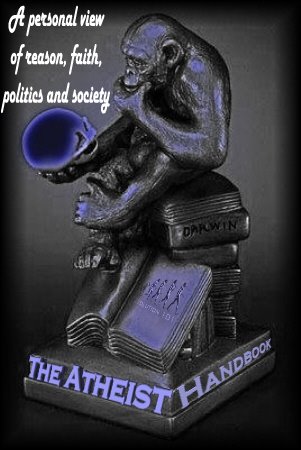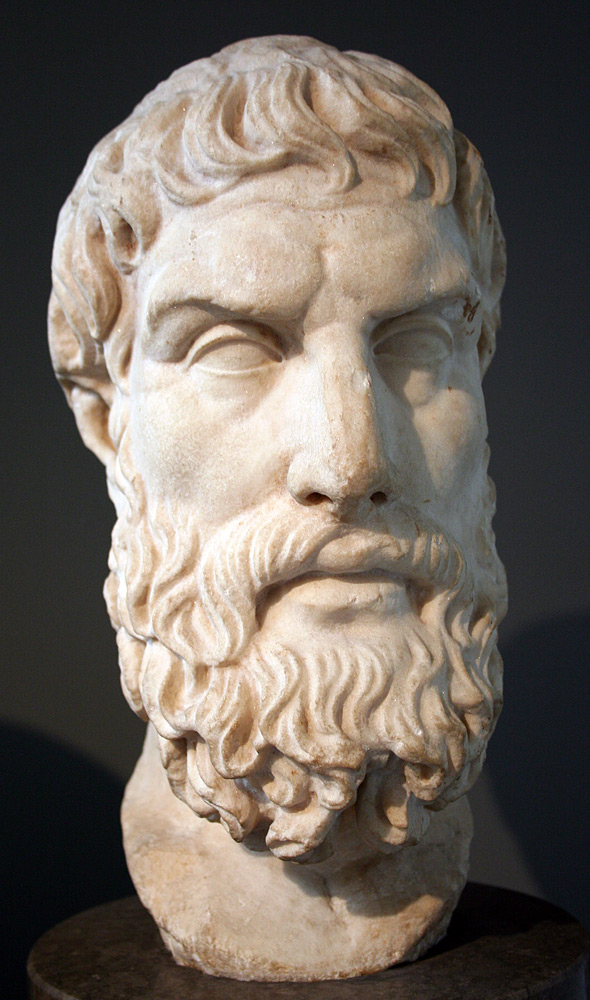
I believe that there is no supreme being with human attributes - no God in the Biblical sense - but that all life is the result of timeless evolutionary forces, having reached its present transient state over millions of years.
-Charles Templeton, preacher turned agnostic.
In my previous entry I gave a brief outline of the debate between Dan Barker of the Freedom from Religion Foundation and Peter Youngren of the Niagara Celebration Church.
What I want to do here is examine a couple of the arguments presented by Peter, by way of my own personal analysis.
Through the debate, Peter made a repeated asseration regarding believing big brain types: Albert Einstein and Anthony Flew. Both deists - which to Peter's credit he acknowledged. But Peter's point, was clear: Here are two men of extraordinary intelligence an insight, and they are convinced at the very least convinced there must be some kind of ultimate force behind the universe. It doesn't interact with us in the biblical sense of God coming down with a burning bush or genocidal flood, but they nevertheless believed there must, logically, be some kind of universe force that got everything in motion.
The connection Peter was trying to make was, if they can accept a god, deist though they were, they surely we of lesser minds cannot argue with them. As Peter said "Anthony Flew says he is convinced by the evidence. Well, that is good enough for me."
This is not a particularly new argument, and one that is often used by believers, albeit often by those lacking Peter's capacity for public discourse. It fails for two reasons. First, the deist view is not the Christian view. Although Peter was, by way of an unspoken inference, trying to link the god of Einstein and Flew to his own Christian god, no such link can be made. Even if one concedes that that there must be a "first cause" behind the universe, that is not evidence for the Christian (or Muslim, or Jewish, or Hindu or whatever) version of god. This is because, as I have noted before, the Christian god has very particular attributes. He has a definite personality - a temper, a willingness to heap favors on those he likes, and destroy those he hates. He describes himself as jealous. And he defiantly has an ego: Just check out the number of times god describes himself in the Old Testament. When he isn't threating to blast someone out of existence, he heaps upon himself all manner of praise. The Greeks would have instantly recognized the hubris in him. Or to put this another way, Dr. Phil would have a field day with God.
Anyway, I digress. The point is one simply cannot look to the deist mode of belief as evidence the Christian god is real - as Peter was doing often during the debate - because the god of Einstein and Spinoza and Flew doesn't have a personality. It doesn't even have a consciousness really. Or if it does, it has never expressed to our species. It NEVER performs miracles or hears prayers. It is really only a kind of universal force that gave order to the whole ball of wax. But that's it.
I think Peter understands this, but tried to make the connection anyway almost as if to say, "Well, if one can accept this deist notion, then its only a small jump to get to Jesus." That just doesn't follow.
Still, Peter Youngren would not be Peter Youngren if he didn't possess the gift of gab. Frankly, Peter is the most talented and convinced preacher I have ever met. And I've met many. He is able to make things seem to fit together - even if in the cold light of logic they do not.
It's worth noting as an aside that Peter is not a fire and brimstone preacher. He isn't threatening anyone with hell fire (although he certainly does believe hell is a real place) and that was demonstrated in a moment at the end of the evening. The last question of the night was asked by a fairly hostile woman who attacked Dan Barker with both guns. She was a health profession, she claimed, and said she sees miracles all the time. She even went so far as to claim that she healed a cancer patient of a tumor!! Well, at this point I was forced to step up, as moderator, and ask her to ask a question. Her reply was as strange as it was shocking:
"Ok my question is to Mr. Youngren, can you be gay and be Christian?" she said before hurriedly sitting down in the nearest seat.
The bait and switch had left the audience shocked for a moment. Dan replied to her by saying that if she had evidence of such things she ought to present it to experts who can examine it. When Peter spoke, he said he was not into, what he called "a ministry of behavior modification." Anyone is welcome at his church, he said, and its not up to him to judge them. Gay people are as good and decent as anyone else he said. It was a moment that had even non believers such as myself nodding our heads in agreement. It was a brilliant bit of preaching and politics, frankly, that spoke both to human solidarity and need to treat everyone with respect.
I bring it up because of what came next in the closing remarks for the evening. Peter closed by saying it was fascinated by Dan Barker: an ex-evangelical turned atheist. In some ways, Dan's story is similar to that of Canadian preacher and former peer of Billy Graham Charles Templeton. In fact for a time, Templeton was the evangelical star and Graham the opening act. But Templeton lost his faith, as Dan did, and began to speak out against what he saw as the cruelty of the Christian doctrine and unlikelihood of a god existing at all. He did not become an atheist as Dan did, but an agnostic.
Templeton wrote a book called "Farewell to God: My reasons for rejecting the Christian faith." It is a deeply personal book, although not the best written, and it was one of the books that got me thinking seriously about the unsoundness of the entire Christian thing. It is, therefore a book I know well and my ears perked up when Youngren invoked Templeton's name.
Peter related a story about Templeton in his final remarks. He read from part of Lee Strobel's book The Case For Faith. Strobel is an apologist who claims to have been a former journalist and atheist. He has a whole series of "Case for..." books purported to "objectively" investigate the claims of Christianity. Generally speaking, these books have all the substance of flash paper. They are not objective at all, and Strobel almost never speaks to experts in their fields or to skeptics. He interviews other believers and accepts their conclusions with a monolithic credulity that no journalist worth his salt should ever display. They are basically apologist tracks thinly dressed up as journalism in the same way Intelligent Design is creationism dressed up in drag.
Still, Strobel occasionally presents an interesting interview or two, and his interview with Templeton is one. Peter read in it part to the audience, and I have to say, his reading was both powerful and moving. Like I said, Peter isn't an excellent preacher by accident. He knows his craft.
In the interview, Strobel asks Templeton what the thinks about Jesus and God. Templeton, now suffering from the slow brain rot of Alzheimer's, sickly and near death, dismissed with the entire idea of a loving god. But for Jesus, he appeared to show some genuine emotion. Strobel, shockingly displaying real journalistic instincts, pressed the issue and asked directly what did Templeton think about Jesus:
"Everything good I know, everything decent I know, everything pure I know, I learned from Jesus. Yes...yes. And tough! Just look at Jesus. He castigated people. He was angry. People don't think of him that way, but they don't read the Bible. He had a righteous anger, and He cared for the oppressed and exploited. There's no question that he had the highest moral standard, the least duplicity, the greatest compassion, of any human being in history. There have been many wonderful people, but Jesus is Jesus."
Peter now had the audience in rapt silent attention. He lowered his voice a bit and read the final lines from Strobel's interview.:
"And if I may put it this way," (Templeton) said as his voice began to crack, "I...miss...him!"
Peter then noted that Templeton waved Strobel away saying "Well, enough of that," and then he ended the story. He went on to say that even Templeton knew Jesus in the end and hoped that Barker would come know the true faith soon.
Being the moderator, I couldn't say anything. My job was not to inject my own thoughts to the debate, but rather to keep it moving in an orderly and fair manner. My own views were not relevant. But I knew something that perhaps Dan Barker, and probably Peter Youngren, did not. The interview with Templeton might be as Strobel reports it. But it is certainly not any evidence that Templeton was near to some kind of death bed conversion.
And this is why I often say "Fact matter!". Because knowingly or not, Peter was not presenting Mr. Templeton's views fairly or accurately. Let this be a lesson to anyone willing to rely on Lee Strobel for information. As a preacher, the guy makes a lousy reporter.
The fact is that yes, Templeton DID miss Jesus. He missed Christianity. He missed the whole religious thing. But this was not shocking or even new. In Farewell to God, Templeton writes about how he missed the certainty religion provides, the easy comfort of believing Jesus and a god that loved him and had a plan for him. And while he could not longer bring himself to believe it anymore, he missed being a believer and could not ignore the impact the figure of Jesus had on his life in a positive sense. No one every said learning was easy or that enligthenment came cheaply. Change is always painful and often filled with regret. Templeton wrote:
"You find yourself rethinking the story of Jesus of Nazareth and, for all its intrinsic fascination, it is not the same. You almost feel that someone you love has died and that you are bereft. And little wonder: no one in Western history has so laid claim to the hearts of men and woman as has Jesus of Nazareth. How memorable his brief life. How fascinating his personality. How insightful his teaching. How inspiring his courage. How shattering the horror of his death. How - perhaps more than any other's in Western history - his life has stimulated the potential for goodness in those who take him seriously.
I miss all that, and more. But, analyzed, the feeling is not unlike the occasional yearning to return to one's earlier years when life was simpler. In the end, one must follow the truth as one perceives it. Not to do so is to live a lie.
Growing up isn't easy, but is there any valid option?"
This is what Peter Youngren and Lee Strobel fail to mention. That Templeton's missing is former faith had nothing to do with believing Jesus was the son of god, sent to save his soul. But it was a a regret at losing something that once gave him such powerful purpose in life.
Templeton, like Einstein, like Flew, ended up as a kind of deist. He believed there might have been some kind of force that got everything going, but it never interfered with human life. His missing his former faith didn't change that.
Which brings us full circle. Youngren's argument was to say "look at these smart guys, they believe in a god, so should you!" But no only is the deist god nothing like the Christian one, not only was Peter not presenting the whole truth about Mr. Templeton, but it makes a final, fatal error in logic. He appeals to authority - a view that certainly Einstein and probably Templeton would have regarded as unwise an an abdication of our own ability to examine evidence and make up our own minds.

















